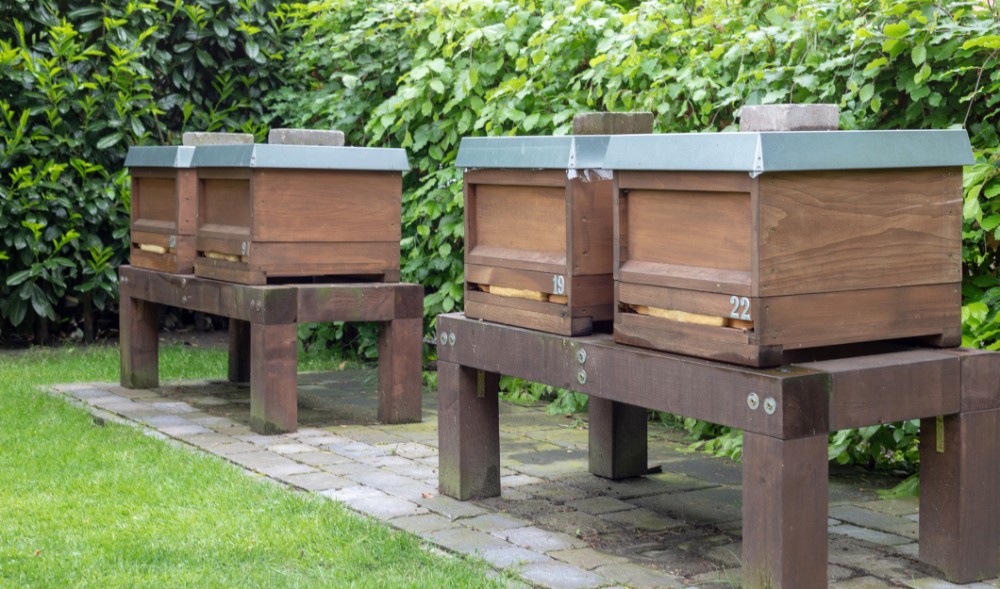
Honeybees are vital pollinators. In fact, they play a part in one out of every three mouthfuls of food we eat. Yet every year we lose nearly half of all beehives. That’s why scientists have turned to cities like Boston, and the urban beekeepers that live here, to help turn the tide.
Bees are exceptional creatures that punch far above their weight when it comes to sustainable habitats, so it’s no surprise that research has shown bees can do quite well in busy cities. Truth be told, bees THRIVE in busy cities and urban bees are much healthier than rural bees. Here’s why:
- Not Only The Strong Survive
City bees survive harsh weather much better in the city. In non-urban environments, more than 50% of a honeybee colony dies over the winter. City buildings protect against this — their infrastructure allows for stronger hives and more ways for bees to stay warm (clustering together, finding shelter in an insulated area).
- Pollination Domination
A city offers much more access to flowers and pollen than even the biggest farms. With the explosion of monoculture farming (growing one type of crop at a time) there is less diversity of crops than ever before for rural bees — and once the one crop is harvested, bees have nothing to pollinate until the next crop blooms. This is obviously not a problem in cities, and many of the flowers and plants there (wild or not), can survive all year long.
- Don’t Spray It
Lastly, cities have far less of the bees worst enemy — pesticides. City parks and gardens rarely use them, and home gardens are more likely to choose organic pest control alternatives. The result is a much healthier city bee with a stronger immune system.
Because of all of this, city bees live considerably longer and produce more honey per year, than rural bees.
Urban Beekeeping
Now that we know that cities may hold the key to a bee comeback, how can we help? Well, there are a few ways.
- Lease Your Space to Beekeepers
- Hire a Professional Beekeeping Service
- Learn Beekeeping Yourself
Do you have a 2ft-by-3ft space on your balcony, porch, backyard, or rooftop? This is all you need for a beehive. Most U.S. cities have a beekeepers association for enthusiasts, professionals, and businesses. Offer your space to your local beekeeper to grow their footprint in your community.
If you have a much larger space available for beehives, a professional beekeeping service can take care of the hive installation and maintenance. Beekeeping is a year-round activity that typically begins with building hives in the winter. Springtime brings the bees into the hives, and the summer and fall are honey harvesting seasons. A professional beekeeping service can also direct the bees from the hives to forage sites as far away from people as possible.
Check your local beekeeping school (yes, this is a thing) for a course to get you started. Learn about building hives, protective clothing, beekeeping equipment, bee health and nutrition, and plenty more. Beekeeping is a relatively low-tech and low-effort activity in terms of time and physical effort — I mean, the bees do most of the work.
Boston: A Case Study
The City of Boston is a healthy, happy place for bees, thanks to creative initiatives by conservationists and nature lovers alike. There are a few reasons Boston is a haven for bees:
- 217 city parks over 2,300 acres throughout Boston
- Over 35,000 trees line the streets
- The “home hives” trend (thanks pandemic)
- Hundreds of residential and commercial properties willing to host a hive
Boston leads the way in building a sustainable home for bees, and other cities are doing the same. Urban hives are popping up in Los Angeles, Seattle, New York City, Washington D.C., and even London and Paris.
Luxury hotels and landmarks also shine a spotlight on urban beekeeping, from Buckingham Palace to Taipei City. That said, two Boston-based beekeeping initiatives are worth mentioning:
- Best Bees
- Boston Area Beekeepers Association
This professional hive management company kicked off operations in 2010. Best Bees has a solid team of certified beekeepers across Massachusetts that installs and maintains hives on private and commercial properties. Best Bees also offers beekeeping courses for individuals, schools, and gardening clubs to build sustainable hives.
All the data from Best Bees hives is accessible to research teams from National Geographic, Harvard, MIT, and NASA to drive pollinator programs worldwide.
Notably, Best Bees partnered with Boston Properties in 2013 to build beehives on four prominent rooftop locations: Prudential Center, Kendall Center, 100 Federal Street, and Atlantic Wharf.
Other than offering Bees an open space to thrive, Boston Properties hives produce over 100 liquid pounds of honey every year. Best Bees also installed hives on the luxury Taj Boston Hotel in 2013. The bees on the Taj pollinate the flowers from the herb and vegetable rooftop garden and the Boston Public Garden across the street. NOTE: The hotel’s menu includes offerings made with honey from their rooftop hives.
Formerly known as the Boston Beekeepers Club, BABA began in 2011 to bring beekeepers and enthusiasts together from Suffolk County and Metro Boston. Thousands of Boston residents engage with BABA every year.
The Association holds regular meetings, annual Bee School courses, and many more events for bee lovers in the area. A local favorite is the Tour de Hives, a bike tour that takes visitors to the beehives across Boston and to hives hosted in community gardens, farms, and schools. The ride ends with a picnic lunch at the Boston Nature Center. This year’s ride is in early June.
The Way Forward
While bee initiatives offer clear wins for both bees and city residents, fears — mostly unfounded — can sometimes stifle the progress of beekeeping in urban environments. Policymakers need to seek to understand and educate on the huge benefits and minimal risks — and recognize beekeeping as a safe, sustainable, and profitable venture.
Quickly reversing the downward trend in bee diversity is essential, and part of the solution is most certainly beekeeping in cities and urban spaces. The more educated we become about urban beekeeping, the faster we can take action, and do our part in the recovery of our global bee population.

